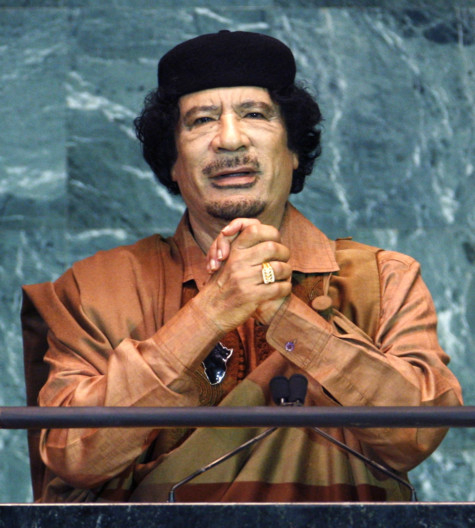
If Donald Trump and Hillary Clinton really are the chosen ones in the American presidential election this autumn, we’ll witness an ugly debate about the “great wall of Mexico”, “emails”, “Trump University” and, here and there, maybe trade or torture. But we also could hear a lot about a small North African country of six million people: Libya — and we should.
Trump will point to Libya as prime evidence of Hillary’s incompetence. He’ll claim she pushed for United States’ intervention in the 2011 revolution against dictator Muammar Gaddafi and the result was a disaster: Chaos, civil war, a new base for Daesh (the self-proclaimed Islamic State of Iraq and the Levant) and the slaying of a US ambassador. Gaddafi, Trump now says, should have been left in place. Hillary may well respond that Nato’s air operation prevented genocide on a Syrian scale — and that Trump strongly supported the operation at the time.
Unlike a lot of what may pass for campaign debate, this would be an argument worth having. Libya is not only a story of US failure, but also a problem that the next president will have a chance to get right — whether he or she likes it or not. As the Pentagon brass have been warning with rising alarm, Daesh is methodically building a base in the country. It could become the new Daesh headquarters if Iraq and Syria are overrun and it could serve as an easy launching pad for attacks on western capitals. Another US plunge into Libya is a matter of when and how — not if.
Fortunately, news organisations have done some thorough reporting of what went wrong the first time. The New York Times published a recent series, and another account appeared in the Washington Post last year. Poring over them, what’s striking is the degree to which US President Barack Obama, who ran against the war in Iraq, nevertheless repeated most of George W. Bush’s Iraq mistakes in Libya.
First was the failure to do any planning for “the day after” the dictator’s fall — a lapse that later prompted a rare admission of error from Obama himself. He said the US and its Nato allies “underestimated the need to come in full force” after the war — just like Bush did in Baghdad.
Then there was the overreliance on smooth, English-speaking, exiled politicians who assured Washington that they could take over Libya and quickly build a new order. Hillary, according to the New York Times, was charmed by Mahmoud Jibril, the US-educated head of an opposition council. Like Iraq’s Ahmad Chalabi, who wooed the Bushes, Jibril proved to have far less influence in his native country than he did in Washington.
Last but not the least was the US decision to focus on political benchmarks while ignoring the mounting security problems. While militias looted weapons from Gaddafi’s stockpiles and forced interim authorities to put their gunmen on official payrolls, American diplomats worked on plans for quick elections. “It was the same mistake you made in Iraq,” French ambassador to the United States Grard Araud told New York Times.
Of course, Obama did not deploy hundreds of thousands of troops, as Bush did. But that may explain the main difference between Iraq and Libya. In Iraq, terrorists were all but wiped out by the US military, which also trained and equipped a substantial national army. Had Obama not prematurely withdrawn all US forces, Daesh might never have gained a foothold.
Some in the Obama administration seem to have taken the Libya failure as a lesson in the futility of all US ventures in the Middle East. America tried occupying Iraq and Afghanistan, goes the logic; it adopted a light footprint in Libya; it stayed out of Syria altogether. In every case, the result was a disaster. Maybe, the Middle East is just too hard.
That, of course, is the Trumpian view. If there is an alternative, it will come, oddly, from Hillary, whose push for the Libyan intervention was in keeping with a broader inclination to assert US power more frequently and with more muscle than Obama has.
She argued for a greater US commitment to Libyan security after Gaddafi’s downfall and for military support of Syrian rebels, only to be overruled by the White House. She appears to understand that the serial US failing in the Middle East was not that it tried, but that it did not try hard enough. Washington failed to plan, minimised resources at crucial moments and pulled out too quickly.
Hillary’s answer to a congressional committee grilling her on Libya last year contains the seeds of a doctrine. “America must lead in a dangerous world,” she said. “When America is absent ... extremism takes root, aggressors seek to fill the vacuum and security everywhere is threatened.” That would make a good answer when the campaign debate turns to Libya.
— Washington Post
Jackson Diehl is deputy editorial page editor for the Washington Post.









